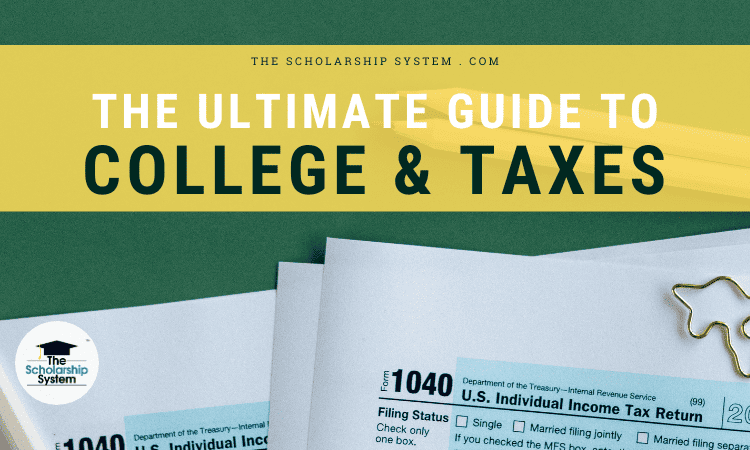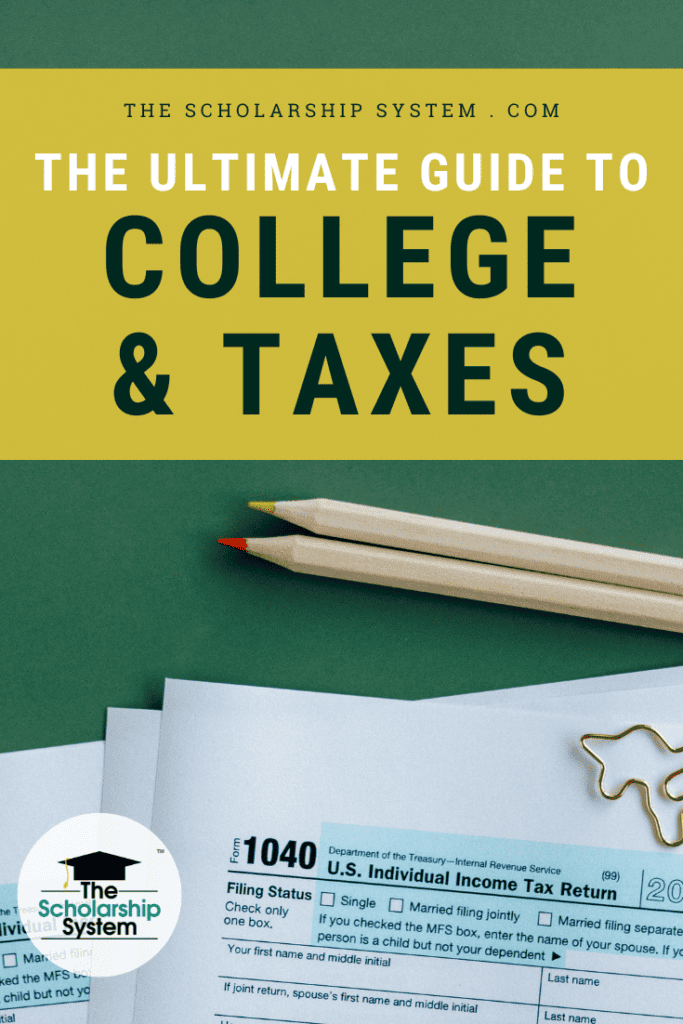Updated on July 3rd, 2024
Tax season is here. While filing taxes isn’t usually a fun time, students do have a chance to take advantage of specific tax benefits related to their status as a student. There are education tax credits and deductions that can lower their federal tax burden significantly, so it’s wise to learn what’s available.
Did you know that scholarships can give your student tax-free money for college expenses? It’s true. If you and your student want to learn about scholarships, sign up for our free college scholarship webinar! Take a quick trip over to http://thescholarshipsystem.com/freewebinar to reserve a spot today.
Now, it’s critical to note that this article isn’t intended to be tax advice. Instead, it’s an overview of what students can explore. Determining eligibility for tax credits, deductions, and other income benefits isn’t always straightforward. That means it’s best to speak with a tax professional to determine if a person who seems like an eligible student genuinely qualifies.
Additionally, there are other tax nuances to navigate, as some situations come with potential drawbacks. With that in mind, here’s our ultimate guide to college and taxes that students and their families can use as a starting point.
Contents
- 1 Do College Students File Their Own Tax Returns?
- 2 Tax Credits and Deductions for College Students
- 3 Scholarships, Grants, and Income Taxes
- 4
- 5 Frequently Asked Questions
- 5.1 How Do I Get the Full $2500 American Opportunity Credit?
- 5.2 Should I Claim AOTC or LLC?
- 5.3 Can You Write Off Student Loan Interest on Taxes?
- 5.4 What Student Expenses Are Tax Deductible?
- 5.5 How Much Money Can a Student Make Without Paying Taxes?
- 5.6 Is Tuition Reimbursement a Tax Write Off?
- 5.7 What If Scholarships and Grants Exceed Tuition on 1098-T?
- 5.8 Is Student Loan Forgiveness Taxable?
Do College Students File Their Own Tax Returns?
Whether a student files their own tax return depends on several factors. Usually, the most significant one is their status as a dependent. Even if a student is technically an adult, their parents may claim them on their tax return if specific conditions are met. That means some students won’t need to file their own returns, as their activity is captured on their parent’s returns.
If a student is a dependent, then some of the tax benefits – such as an education credit – associated with being a student can still go on the parent’s return. That means students and their families don’t necessarily miss out just because the student is classified as a dependent.
However, dependent students can still file their own tax returns if they prefer. They’ll need to state that someone else claims them as a dependent. Additionally, the student needs to make sure that they’re not claiming any education tax credits or benefits that their parents are claiming, as double-dipping like that isn’t allowed.
As a result, students should speak with their parents if they are a dependent while pursuing higher education. That way, students can coordinate with their parents before they file tax returns during the tax years when they’re considered a dependent.
Tax Credits and Deductions for College Students
Education Tax Credits
For US tax filers, there are two main education tax credits: the American Opportunity Tax Credit and the Lifetime Learning Credit. Each one has its own rules, but there are three requirements they have in common based on guidelines from the IRS:
- You, your dependent, or a third party paid qualified educational expenses for higher education during the tax year.
- An eligible student was enrolled at an eligible educational institution during the tax year.
- The eligible student is either the tax filer, their legal spouse, or an eligible dependent that is listed on the tax return being filed.
The three conditions above must all be met to receive either education tax credit. Additionally, only specific qualified education expenses can make a student eligible for a tax credit. Tuition and certain mandatory fees are eligible. However, room and board, transportation, insurance, and medical expenses don’t qualify.
There are additional rules to navigate as well, so it’s wise to review IRS documentation or speak with a tax professional for additional insights if they’re needed.
American Opportunity Tax Credit
The American Opportunity Tax Credit (AOTC) is worth up to $2,500, based on the amount a student pays in the form of tuition, specific fees, and certain course materials (such as books, supplies, and equipment). Whether a material qualifies depends on whether it’s necessary for attending the student’s selected courses at the school.
Along with reducing a student’s tax burden, the AOTC is a partially refundable credit. Forty percent of the credit amount a student qualifies for is potentially refundable, up to $1,000.
Students must be pursuing a college degree or similar academic credential to qualify and need to be in their first four years of higher education. Additionally, being enrolled at least half-time at an educational institution is required. Receiving a Form 1098-T from an eligible educational institution is also a must to qualify for the tax credit.
There is a limit to the number of years the AOTC can be claimed for a particular student. Students can’t have claimed the AOTC (or the former Hope Credit) for more than four tax years at the time of the new tax filing. Additionally, students aren’t eligible if they’ve had a felony drug conviction.
Like many tax credits, this one phases out based on the student’s or household’s taxable income. For this education tax credit, those with a modified adjusted gross income (MAGI) below $80,000 (below $160,000 for joint filers) are potentially able to get the full credit. Between $80,000 and $90,000 ($160,000 and $180,000 for joint filers), it reduces before finally going away for incomes above $90,000 ($180,000 for joint filers).
Since determining whether a student qualifies is potentially complex, speaking with a professional tax preparer is often a wise move.
Lifetime Learning Credit
For the Lifetime Learning Credit (LLC) – also referred to as the Lifetime Learning tax credit – the maximum credit is worth up to $2,000 per tax return. The amount received is based on 20 percent of the first $10,000 of qualifying educational expenses, and it can help with costs related to an undergraduate, graduate, and professional degree program, as well as courses that improve job skills. There is no limit to the number of years a tax filer can claim the lifetime learning credit.
The exact amount a student can receive with an LLC depends on their MAGI, too. For tax year 2023, it starts phasing out for single filers with MAGIs between $80,000 and $90,000, and those making above $90,000 aren’t eligible for the credit. When filing jointly, the phase-out occurs between $160,000 and $180,000, with households earning over $180,000 becoming ineligible.
Tax Deductions for College Students
Tax deductions are another way for students to reduce how much they owe when they file a federal income tax return. In previous years, there were two tax deductions students could consider. However, the tuition and fees deduction ended, reducing the number of options available.
Currently, there is one tax deduction that students can typically leverage: the student loan interest deduction.
Student Loan Interest Deduction
The student loan interest deduction is worth the lesser of $2,500
or the amount of student loan interest paid during the tax year in question. However, the interest must have been paid to a qualified student loan to get this education tax break. Generally, that means a loan that was used solely for qualifying expenses, based on the IRS definition of qualified expenses.
For student loan interest deductions, the definition of qualifying education expenses is broader than it is for some credits. Per the IRS, it can include:
- Tuition and Fees
- Room and Board
- Books, Supplies, and Equipment
- Other Necessary Expenses (such as transportation)
However, there are limitations to navigate. For example, the allowed amount for room and board is based on what’s listed as a student’s education expenses or college costs within the cost of attendance used for federal financial aid purposes.
Students who pay at least $600 in interest during a tax year receive a 1098-E from their student loan company. That form shows the amount of interest paid, making it easier for students to determine the exact value of their deduction each year.
However, if students only used some of the funds to cover tuition, fees, and equipment required for courses, and the rest was used for non-qualified purposes or non-educational activities, deducting the interest may not be possible. When in doubt, speak with a tax professional to get guidance specific to your student’s situation.
Scholarships, Grants, and Income Taxes
Scholarships and grants are some of the most popular forms of financial aid since they don’t result in debt. However, students do need to determine if they’ll owe taxes on the money.
Whether a student pays taxes on scholarships or grants received varies. There are scenarios where scholarships and grants qualify as taxable income. However, there are also situations where they are tax-free.
Overall, the IRS is pretty generous when it comes to grant and scholarship funds and taxes, but the grant or scholarship money must be spent the right way. Otherwise, the awards become taxable according to the tax code.
Here’s a quick overview of taxable and tax-free grant and scholarship funds.
Untaxed Scholarship Funds
In most cases, students don’t have to pay taxes on college scholarships if the cash is spent on qualified educational expenses (based on the IRS definition). Qualifying educational expenses include:
- Tuition
- Fees Required for Attendance (such as mandatory student activity fees)
- Books
- Equipment and Supplies (listed as must-haves for the course)
Essentially, if the expense is a requirement for enrolling in the college or a particular class, your student usually won’t owe taxes on the scholarship funds used to pay that cost.
It also doesn’t matter if your student pays the money to the college. For example, if your student opts to buy their books online instead of at a campus bookstore, that is still a qualifying educational expense.
However, it’s critical to note that most optional purchases don’t fall into the qualified expenses category. For example, a relevant book that’s not on a course’s required reading list may not meet the definition outlined by the IRS. Similarly, purchasing a computer – even if it helps with completing assignments, studying, or taking notes in class – may not meet the definition either. As a result, it’s wise to consult with a tax professional if there are any doubts about a purchase’s eligibility.
Taxable Scholarship Funds
Scholarship money not used on qualifying educational expenses is considered taxable income, so it will lead to a higher tax bill. This includes funds spent on other living expenses, as well as any your student chooses to save for a rainy day.
Regardless of whether the money is used to pay the school or any other business or institution, these costs are not qualifying educational expenses in the eyes of the IRS:
- Room and Board
- Insurance
- Medical Costs (including student health fees)
- Transportation Expenses
- Utilities
- Equipment or Supplies Not Required for a Qualifying Course
- Other Living Expenses or Personal Expenses
Similarly, money spent on sports that are not part of credit-earning courses does not qualify. Unless the sport is part of an actual degree plan, any scholarship money spent on it is taxable. The same goes for amounts paid on hobbies, games, social events, or other expenses of that nature.
Taxable Stipends
While most grant and scholarship awards used on qualifying educational expenses are not taxed, if your student’s scholarship or grant includes a stipend, that money is usually considered income.
A stipend is money given in exchange for a service. For example, if your student receives a scholarship in exchange for assistant teaching a class, that money is income for tax purposes and, therefore, is an income subject to state and federal taxes.
This caveat also applies to scholarships or grants that require the promise of future services. Playing off that last example, if your student is a freshman, accepts the award, and that scholarship or grant is compensation for a commitment to assistant teach when they are a senior, that is a stipend and is considered taxable income.
Usually, stipends occur more for graduate student scholarships or grants than undergraduate students. However, that doesn’t mean there aren’t undergrad awards out there with stipends, so it is important to be aware of this scenario when you are trying to understand scholarships and taxes.
Frequently Asked Questions
How Do I Get the Full $2500 American Opportunity Credit?
Qualifying for the full $2,500 AOTC required meeting specific criteria. First, students must have a modified adjusted gross income of $80,000 or less ($160,000 or less if filing jointly). Second, they need at least $4,000 in qualifying expenses during the same year. However, other factors do come into play, so students should review the IRS rules for additional details.
Should I Claim AOTC or LLC?
If a student is eligible for both the American Opportunity Tax Credit and the Lifetime Learning Credit, which of the education tax credits they should claim on their income tax return depends on their unique situation. Each has unique rules and requirements, as well as different maximum credit sizes. While AOTC is usually recommended to students who are eligible, it’s often best to consult with a tax professional if there’s any uncertainty regarding what to claim.
Can You Write Off Student Loan Interest on Taxes?
Student loan interest is potentially deductible as long as the loan was solely used for qualifying educational expenses. However, there are income limitations and other restrictions, so it’s crucial to review rules set forth by the IRS to confirm eligibility.
What Student Expenses Are Tax Deductible?
In most cases, the IRS defines qualifying educational expenses as money spent on tuition, mandatory fees, books, supplies, and equipment. However, that largely pertains to eligibility for specific credits and deductions, as there aren’t many mechanisms for writing off fully qualified education expenses or expenses incurred as part of a student’s enrollment outside of that.
However, there are a few exceptions. For example, work-related education may qualify for a business deduction. There are also tax benefits for education expenses associated with 529 Plans and similar college savings plans. However, since these situations are more complex, it’s usually best to consult with a tax professional to determine what deductions are potentially available.
How Much Money Can a Student Make Without Paying Taxes?
How much money a student can make without owing any federal or state taxes varies based on several factors. The source of the income plays a role, as well as the total amount earned. Eligibility for credits and deductions are also part of the equation. As a result, it’s best to consult with a tax professional to determine if any particular threshold was crossed.
Is Tuition Reimbursement a Tax Write Off?
Generally, students can exclude tuition reimbursement or employer-provided student loan repayment benefits from their taxable income, though only up to a certain amount. Currently, the maximum amount that can be tax-free is $5,250, with any amount above that threshold becoming taxable income.
What If Scholarships and Grants Exceed Tuition on 1098-T?
If the amount received in the form of scholarships or grants exceeds the amount listed on a student’s 1098-T Tuition Statement, the excess amount is considered taxable income unless the student has additional qualifying school expenses that cover the excess amount.
Is Student Loan Forgiveness Taxable?
Having student loans forgiven may or may not come with tax-related consequences. Generally, it depends on the type of student loan forgiveness received and when it occurs. Additionally, whether forgiveness triggers state taxes (even if there aren’t federal taxes owed) can vary. As a result, it’s best to consult with a tax professional to determine whether the specific kind of forgiveness received comes with tax implications.
Did you know that scholarships can give your student tax-free money for college expenses? It’s true. If you and your student want to learn about scholarships, sign up for our free college scholarship webinar! Take a quick trip over to http://thescholarshipsystem.com/freewebinar to reserve a spot today.








Leave a Reply